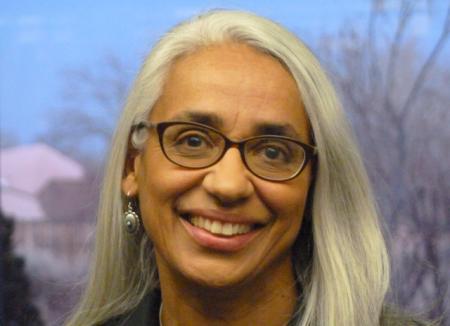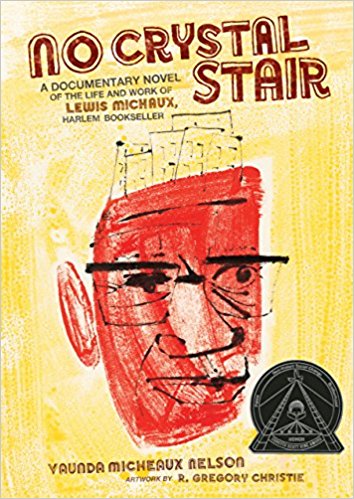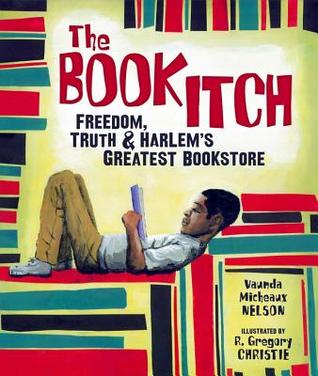
For the 2017-2018 school year, the Poetry Center’s Brave Books exhibit is modeled after Lewis Michaux’s African National Memorial Bookstore, which stood in Harlem from the 1930s until the 1970s and was an important learning, organizing, and community space for Civil Rights leaders and Black Arts Movement writers. Vaunda Micheaux Nelson, Lewis’ grandniece, has written two books about the store, The Book Itch and No Crystal Stair, for children and young adults. This Wednesday, April 25, at 7 pm, Micheaux Nelson will read from her work here at the Poetry Center, followed by a discussion with Dr. Stephanie Troutman. The Poetry Center’s Education Department is so excited about this visit, and about Micheaux Nelson’s incredible books! Here’s a taste of what’s in store …
No Crystal Stair: A Documentary Novel of the Life and Work of Lewis Michaux, Harlem Bookseller
 No Crystal Stair is a fictionalized oral history of Lewis Michaux and the African National Memorial Bookstore narrated by a chorus of voices, including members of Michaux’s family, the bookseller himself, and some of the store’s patrons—a Harlem street vendor, a young man who later becomes a doctor, a white reporter interested in Civil Rights issues. Micheaux Nelson weaves these first person stories with photographs, newspaper clippings, and excerpts from Michaux’s FBI file--which narrate his involvement in the Civil Rights and Black Power movements--to tell the story of Michaux’s life, from his childhood and rebellious youth in Virginia and Philadelphia to his legacy as the proprietor of a critically important Harlem institution. While influential political figures and writers—including Malcolm X, Amiri Baraka, and Langston Hughes—befriended Michaux and spent time in his shop, No Crystal Stair emphasizes the connections Michaux made with less-famous visitors like Snooze, a teenager who initially resists Michaux’s book recommendations but later, inspired by the bookseller, becomes the youth programs coordinator at a local community center.
No Crystal Stair is a fictionalized oral history of Lewis Michaux and the African National Memorial Bookstore narrated by a chorus of voices, including members of Michaux’s family, the bookseller himself, and some of the store’s patrons—a Harlem street vendor, a young man who later becomes a doctor, a white reporter interested in Civil Rights issues. Micheaux Nelson weaves these first person stories with photographs, newspaper clippings, and excerpts from Michaux’s FBI file--which narrate his involvement in the Civil Rights and Black Power movements--to tell the story of Michaux’s life, from his childhood and rebellious youth in Virginia and Philadelphia to his legacy as the proprietor of a critically important Harlem institution. While influential political figures and writers—including Malcolm X, Amiri Baraka, and Langston Hughes—befriended Michaux and spent time in his shop, No Crystal Stair emphasizes the connections Michaux made with less-famous visitors like Snooze, a teenager who initially resists Michaux’s book recommendations but later, inspired by the bookseller, becomes the youth programs coordinator at a local community center.
Among the most compelling voices is that of poet Nikki Giovanni. In the 1960s, she was a young up-and-comer and a frequent patron of the African National Memorial Bookstore. “Well I have arrived!” Giovanni-as-character says, “When he closed the store tonight, Lewis looked at me and said, ‘Giovanni, would you like a cup of coffee?’ I knew what he meant, and I know you have to be pretty important to be asked.” In the book’s last section, a series of homages to and memories of Michaux, Giovanni brings home the importance of the bookstore. “I think there’s a war on independent bookstores. It’s a crime because books are more than just books in the African-American community,” she writes, “Literacy and education were once the hopes for getting away from slavery, out of the ghetto, into power … The bookstore is where we meet, where we talk. In the sixties, in Harlem, at 125th and Seventh, it was Lewis Michaux’s bookstore.”
While No Crystal Stair is technically for young adults, Micheaux Nelson weaves an engaging and vital history lesson for all ages within the book’s 188 pages.
The Book Itch: Freedom, Truth, and Harlem’s Greatest Bookstore
 Lewis “Louie” Michaux Jr., Lewis Michaux’s son, narrates The Book Itch, Micheaux Nelson's picture book about her great-uncle and his store. R. Gregory Christie’s vivid, impressionistic illustrations bring twentieth-century Harlem to life, and Micheaux Nelson deftly uses a child’s point of view to share the wonders of the bookstore and the work of Lewis Michaux Sr. with her young readers. Louie details how his father sold books on the street and washed windows in order to open a storefront—he couldn’t get a loan because, to quote the banker, “’Black people don’t read.’” (Of course, shortly after the African National Memorial Bookstore opened, it was buzzing with patrons.) The grade school narrator also tells the reader that Lewis Sr. invites visitors to spend the day in the store, reading and talking, without pressuring them to buy anything; and urges Louie to read widely because, “the more you read, the easier it is to figure out for yourself what is true.” Lewis Sr. is a rhymer, often spouting witticisms like, “Knowledge is power, you need it every hour. Read a book!” leading little Louie to say, “He plays with words until they say what he feels. I guess that makes him a poet.”
Lewis “Louie” Michaux Jr., Lewis Michaux’s son, narrates The Book Itch, Micheaux Nelson's picture book about her great-uncle and his store. R. Gregory Christie’s vivid, impressionistic illustrations bring twentieth-century Harlem to life, and Micheaux Nelson deftly uses a child’s point of view to share the wonders of the bookstore and the work of Lewis Michaux Sr. with her young readers. Louie details how his father sold books on the street and washed windows in order to open a storefront—he couldn’t get a loan because, to quote the banker, “’Black people don’t read.’” (Of course, shortly after the African National Memorial Bookstore opened, it was buzzing with patrons.) The grade school narrator also tells the reader that Lewis Sr. invites visitors to spend the day in the store, reading and talking, without pressuring them to buy anything; and urges Louie to read widely because, “the more you read, the easier it is to figure out for yourself what is true.” Lewis Sr. is a rhymer, often spouting witticisms like, “Knowledge is power, you need it every hour. Read a book!” leading little Louie to say, “He plays with words until they say what he feels. I guess that makes him a poet.”
While Louie gets to meet Muhammad Ali and rub shoulders with Malcolm X, his hero continues to be his dad. When Malcolm X is assassinated, Lewis Sr. tells Louie, “But people won’t forget Malcolm. His words will never leave us.” His fatherly advice underscores the importance of books in keeping ideas and memories alive, and bookstores as vital locations for the exchange of ideas. The Book Itch not only honors Lewis Michaux’s legacy, but highlights the magic that can happen in brick-and-mortar spaces—an important reminder in this increasingly digital world.

